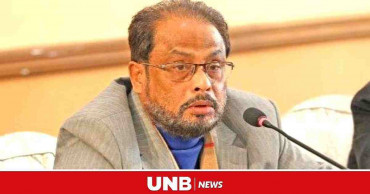mismanagement
It seems Bangladesh is paradise of mismanagement: GM Quader
Expressing profound shock at the loss of 11 lives in two separate incidents in the capital on Monday, Jatiya Party Chairman GM Quader on Tuesday said Bangladesh has apparently become a paradise of mismanagement.
In a condolence message, he said, “It seems that Bangladesh will be the world champion in mismanagement if a survey is conducted.”
GM Quader, also the deputy opposition leader in parliament, said it has become normal that countless mothers will lose their children every day due to negligence and mismanagement.
“Accidents have now become an order of the day be it on roads, waterways or in industrial plants or any public places. It can’t continue like this and it can’t be allowed to go on like this,” he observed.
Read:Accept tea workers' logical demand for pay hike: GM Quader
The Jatiya Party chief said the government must make public the investigation reports into the two incidents--girder crash at Uttara and a plastic factory fire at Chawkbazar in Dhaka.
He also called upon the authorities concerned to take legal action against those responsible for the incidents.
“Such heartbreaking deaths are unacceptable. The areas where heavy and hazardous work is going on should be protected and restricted. It has to be investigated for whose negligence the vulnerable site (of the BRT project) was not restricted and legal action should be taken against them,” the Jatiya Party chief said.
Besides, he said many people are losing lives in fire incidents, including six people at Chawkbazar on Monday. “It seems there’s no one to be held accountable for the incidents.
On Monday, five members of a family were killed as a girder of the BRT project lifted by a crane crashed on a private car in the city’s Uttara area.
Earlier in the day, at least six people were burnt to death in a fire that broke out at a plastic factory in Old Dhaka’s Chawkbazar area.
3 years ago
HC: Bangladesh Railway gets 7 days more to submit report on mismanagement
The High Court has granted seven more days to Bangladesh Railway to submit a report on mismanagement including black marketing of tickets, carrying passengers on roof etc.
Bench of Justice Nazrul Islam Talukder asn Justice Khizir Hayat Khan passed the order on Sunday after the rail authority appealed seeking extension of time.
Deputy Attorney General AKM Amin Uddin represented the state during the hearing.
The court has asked to submit the compliance report by Sunday after extending the time, said the DAG.
On July 21, the HC bench asked the railway authorities to submit an action taken report by July 31 on its order to stop traveling on train tops and black-marketing of train tickets.
Read: Rail mismanagement: Roni suspends movement
Earlier, the court also wanted to know the stance of Dhaka University (DU) student Mohiuddin Roni’s protest about his six-point demand as he staged demonstrations at Kamalapur station from July 7-18 against Bangladesh Railways mismanagement.
The High Court also wanted to know what steps the Anti-Corruption Commission took after Rony’s protest against corruption in the country's railway sector.
Following the court's order, the railway authorities said that a probe body was formed to look into the allegations.
A letter of the probe body was also submitted to the court by Deputy Attorney General AKM Amin Uddin.
Read: BNP blames AL’s internal feud for Narail communal violence
Roni, from July 7, has been demanding the implementation of his six-point demand after being deceived by SOHOZ.com while buying a train ticket to go home during the vacation of Eid-Ul-Azha.
However, when he alleged this deception to the Directorate of National Consumer Rights Protection (DNCRP), they investigated it and fined SOHOZ.com an amount of TK. two lakh of which Roni was given Tk 50,000 on July 20.
On July 25, Roni suspended his movement after a meeting with the high officials of Bangladesh Railway including the Railways secretary and Director General when the authority agreed with his demands.
3 years ago
Mismanagement behind submersion of haor areas’ crops: BNP
BNP senior joint secretary general Ruhul Kabir Rizvi on Tuesday blamed the government's mismanagement and incompetence for the submersion of crops before harvest in unseasonal early flash floods caused by onrush of waters from upstream.
“Vast haor areas of Sunamganj, Kishoreganj and Netrokona in the country went underwater due to the onrush of upstream water. Boro crops are being damaged the most by the early flash flood,” he said.
Rizvi made the remarks while speaking at a press briefing at BNP’s Nayapaltan central office.
“Hundreds of crores of taka were allocated for the construction of dams in the haor region. The ruling party leaders and relatives of the government high-ups have been given the responsibility for the construction of the dams. As they did not build dams in time, the people in the haor region are now being subjected to huge losses,” he said.
The BNP leader also said people in the haor areas are going through serious ordeals due to the flash flood as their houses too have become submerged.
Stating that different countries are facing a food crisis due to the ongoing Ukraine War and other global problems, Rizvi said this crisis may intensify in Bangladesh as a huge swathe of land with crops has been inundated by the flash flood.
READ: Public suffering reaches extreme stage: BNP
“Huge areas with crops are being submerged by untimely floods due to the incompetence and mismanagement of the government. Ordinary people's houses and crops are being damaged,” he observed.
He said the current government is least bothered about public suffering as it is indulging in anti-mass activities.
Rizvi called upon BNP leaders and activists to stand beside the affected people in the haor area with the necessary support to ease their sufferings.
3 years ago
Polls open in Iraq's general elections amid tight security
Iraq closed its airspace and land border crossings on Sunday as voters headed to the polls to elect a parliament that many hope will deliver much needed reforms after decades of conflict and mismanagement.
The vote was brought forward by six months in response to a popular uprising in the capital Baghdad and southern provinces in late 2019, when tens of thousands of people took to the streets to protest endemic corruption, poor services and rising unemployment. They were met with deadly force by security forces firing live ammunition and tear gas. More than 600 people were killed and thousands injured within just a few months.
Although authorities gave in and called the early elections, the death toll and the heavy-handed crackdown prompted many young activists and demonstrators who took part in the protests to later call for a boycott of the polls.
A series of kidnappings and targeted assassinations that killed more than 35 people, has further discouraged many from taking part.
Read: Biden says US combat mission in Iraq to conclude by year end
A total of 3,449 candidates are vying for 329 seats in the parliamentary elections, which will be the sixth held since the fall of Saddam Hussein after the US-led invasion of Iraq in 2003.
More than 250,000 security personnel across the country were tasked with protecting the vote. Army troops, police and anti-terrorism forces fanned out and deployed outside polling stations, some of which were ringed by barbed wire.
“Get out and vote, and change your reality for the sake of Iraq and your future,” said Iraqi Prime Minister Mustafa al-Kadhimi, after he cast his ballot at a school in Baghdad's heavily fortified Green Zone, home to foreign embassies and government offices.
“To those who hesitate, put your trust in God and go and choose those you deem appropriate,” he added, reflecting concerns over a low turnout. “This is our opportunity.”
The 2018 elections saw just 44% of eligible voters casting ballots, a record low. The results were widely contested. There are concerns of a similar or even lower turnout this time.
Iraq’s top Shiite cleric and a widely respected authority, Grand Ayatollah Ali al-Sistani, has called for a large turnout, saying that voting remains the best way for Iraqis to take part in shaping their country’s future.
The election is the first since the fall of Saddam to proceed without a curfew in place, reflecting the significantly improved security situation in the country following the defeat of the Islamic State group in 2017. Previous votes were marred by fighting and deadly bomb attacks that have plagued the country for decades.
As a security precaution, Iraq has closed its airspace and scrambled its air force from Saturday night until early Monday morning.
In another first, Sunday's election is taking place under a new election law that divides Iraq into smaller constituencies — another demand of the activists who took part in the 2019 protests — and allows for more independent candidates.
Read:Death toll rises to 92 in blaze at coronavirus ward in Iraq
A U.N. Security Council resolution adopted earlier this year authorized an expanded team to monitor the elections. There will be up to 600 international observers in place, including 150 from the United Nations.
Iraq is also for the first time introducing biometric cards for voters. To prevent abuse of electronic voter cards, they will be disabled for 72 hours after each person votes, to avoid double voting.
But despite all these measures, claims of vote buying, intimidation and manipulation have persisted.
The head of Iraq’s electoral commission has said that initial election results will be announced within 24 hours.
4 years ago
Public life at stake for mismanagement in vaccination drive: BNP
BNP on Thursday alleged that the mismanagement in the government’s Covid-19 vaccination drive has jeopardised the public life.
“There has been a complete mess in the vaccination campaign due to the government’s failure to face the pandemic,” said BNP secretary general Mirza Fakhrul Islam Alamgir.
Read: Frustration grows as chaos continues at Bangladesh’s vaccination centres
He made the remarks when he visited Banani Graveyard in the city to place wreaths and offer Fateha at the grave of Arafat Rahman Koko, the youngest son of BNP chairperson Khaleda Zia, marking his 52nd birth anniversary.
Fakhrul urged the government to collect adequate number of vaccine doses immediately and work sincerely for people announcing a roadmap to deal with the pandemic.
He alleged that the government has totally failed to manage corona. They (govt) shouldn’t be in power any more for its ill-planned lockdown and mismanagement in the vaccination drive. “This government should go right away.”
The BNP secretary general paid homage to Koko and recalled his role in the development of sports organisations and cricket.
Read:Mismanagement, politicization made vaccination drive a complete mess: BNP
BNP leaders Aman Ullah Aman, Abdus Salam, Fazlul Haque Milon, Syed Emran Saleh Prince, Shamsur Rahman Shimul Biswas, Aminul Haque and Rafiqul Alam Majnu, Jubo Dal leaders Saiful Alam Nirob and Sultan Salauddin Tuku, Swechchasebak Dal leaders Mustafizur Rahman and Abdul Kader Bhuiyan Jewell and Chhatra Dal leader Fazlul Ramna Khokon were, among others, present.
On January 23, 2015, Arafat Rahman Koko died of cardiac arrest in Malaysia at the age of 45.
4 years ago
Mismanagement, politicization made vaccination drive a complete mess: BNP
BNP Secretary General Mirza Fakhrul Islam Alamgir on Sunday alleged that the government has politicised the mass vaccination programme by deceiving the common people.
"Our standing committee thinks the government has indulged in mass deception in the name of mass vaccination without collecting enough vaccine doses. The mass vaccination campaign has become a drive to spread mass infection due to extreme mismanagement and politicisation,” he said.
Fakhrul came up with the remarks while unveiling the decisions of a virtual meeting of BNP standing committee at a press conference at the party chairperson’s Gulshan office. The meeting was held on Saturday evening.
Also read: Covid mortality rate high for lack of treatment: BNP
He said their party policymakers urged the government to take effective measures to ensure general vaccination coming out of the process of ‘politicisation’. “We strongly condemn and protest the involvement of ruling party workers in the mass vaccination programme.”
4 years ago
Health directorate DG Dr Abul Kalam finally resigns
Embattled Director General of Directorate General of Health Services (DGHS) Dr Abul Kalam Azad has resigned amid criticisms over irregularities and mismanagement in the health sector.
5 years ago





.png)
.jpg)



